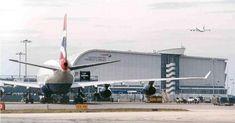
The cost of importing fresh produce by air could be about to rise if new government air tax proposals become a reality, freight experts are warning.
The airfreight trade has claimed it could be gutted by the new tax as the Treasury looks to claw back the national deficit.
Already battling a recession which has put severe downward pressure on freight forwarding businesses, the industry is bracing itself for new charges in the emergency budget, to be announced on 22 June.
The proposed restructuring of air passenger duty, which would be a tax per plane rather than the current per passenger duty, could seriously hit the availability and cost of fresh produce lines exported to the UK from developing countries, according to the Fresh Produce Consortium.
The beleaguered airfreight trade has already suffered with increases in fuel prices, BA strikes and the impact of the volcanic ash cloud, and there are concerns that extra taxes would push more UK firms into financial trouble.
The FPC is lobbying the Treasury on the issue and its chief executive Nigel Jenney described the proposals as “a blunt instrument which will raise additional revenue from the aviation industry for the Exchequer, without any specific objectives in terms of reducing environmental impacts”.
Aviation duty was first discussed under the previous government but a consultation that concluded in November 2008 found that the disruption to the airfreight trade was not viable and an international approach was needed to dictate the cutting of emissions.
Now there are fears in the industry that the new coalition government will target airfreight, a sector which has taken a battering in terms of public perception in recent years due to increased environmental concerns.
Fresh produce importers believe the current air passenger duty is a fairer tax than the imposition of a per plane levy, reflecting the fact that the majority of airfreighted fresh produce is transported in passenger aircraft.
Simon Derrick, communications manager at importer Blue Skies, said: “We need more clarity on how this tax will impact airfreight. Our concern is that a per plane tax should not disproportionately penalise airfreighted fresh produce from developing countries.”
Airfreighted imports of fruit and vegetables account for 0.2 per cent of total UK greenhouse gas emissions and airfreighted food is responsible for 11 per cent of all UK food chain greenhouse gases.
“We are being taxed to death,” said Mike Parr, MD of Perishable Movements Ltd. “They brought in the phytosanitary charges and now this. It is the minority supporting the majority while the recession grows worse by the day. People have to eat so there’s only one choice and only one winner - the government. The aircraft are going to fly whether there’s one box on it or it’s full. We are making use of the space so the current system makes more sense.”
The UK’s Department for International Development claims robust action is necessary to tackle climate change but believes restricting airfreight will have negative economic impacts on developing countries as increased productivity means cheaper food, more jobs and higher incomes.



